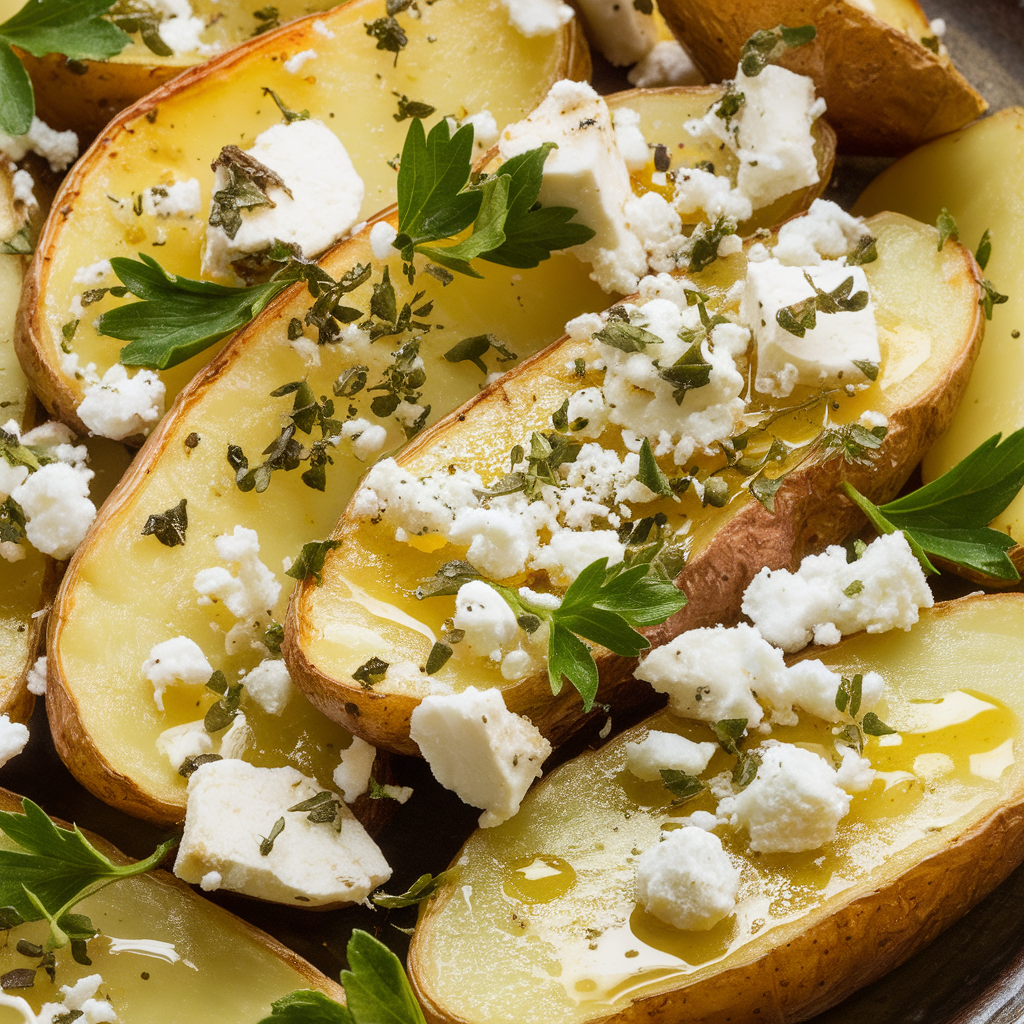Greek cuisine offers a beautiful combination of fresh, vibrant ingredients and simple cooking techniques that deliver unforgettable flavor. Among the most iconic dishes beloved worldwide are Greek Potatoes with Feta, a mouthwatering take on roasted potatoes that are infused with tangy lemon, fragrant herbs, garlic, and finished with creamy, salty feta cheese. This recipe represents the essence of authentic Greek cooking and fits perfectly into Mediterranean diet recipes that prioritize wholesome, nutritious, and delicious meals.
If you’re looking for an easy yet impressive side recipe to accompany your favorite grilled meats or vegetarian mains, or want a satisfying veggie dish that highlights the best of Mediterranean flavors, Greek Feta Roast Potatoes are an unbeatable choice. This dish doubles as a comforting staple and an elegant addition to your dinner table.
Why Greek Feta Roast Potatoes Are a Must-Have in Your Recipe Collection
Greek-style potatoes roasted with lemon and topped with feta cheese offer several compelling benefits:
- Bold and Balanced Flavor: The bright acidity of fresh lemon juice complements the richness of feta, while garlic and herbs add layers of aroma and taste.
- Textura Perfeita: Potatoes roast to a golden crisp outside with a tender, fluffy interior—a perfect contrast to the creamy feta.
- Healthful Ingredients: This dish fits beautifully into the Mediterranean diet, known for heart-healthy fats like olive oil, antioxidants, and fresh herbs.
- Simple, Accessible, and Versatile: Few ingredients and easy prep make it an ideal recipe for beginner and seasoned cooks alike.
- Ideal for Multiple Diets: Naturally gluten-free and vegetarian-friendly, this recipe caters to a wide variety of dietary preferences.
- Great for Entertaining or Weeknight Meals: Whether for a casual family dinner or a festive Mediterranean feast, it impresses with minimal effort.
Ingredients: What You Need for Authentic Greek Lemon Potatoes With Feta
To prepare this traditional yet elevated dish, gather these simple, high-quality ingredients:
- Potatoes: 2 pounds of baby potatoes or medium Yukon Gold potatoes, peeled and cut into chunks
- Olive oil: 3-4 tablespoons of extra virgin olive oil for roasting and flavor
- Fresh lemon juice: Juice of 1 large lemon (approx. 3 tablespoons) — the star of Greek lemon potatoes recipes
- Garlic: 4 cloves, minced for aroma and savoriness
- Herbs: 1 teaspoon dried oregano (the signature Greek herb), 1 teaspoon dried thyme (optional)
- Salt and pepper: To taste — enhances all flavors
- Feta cheese: 150 grams (about 5 ounces), crumbled for topping — use quality Greek feta for authenticity
- Fresh parsley or dill: Chopped, for garnish and freshness
- Opcional: Smoked paprika or red chili flakes for a spicy, smoky variation

Detailed Step-by-Step Instructions for Greek Style Potatoes Lemon and Feta
Step 1: Preparing the Potatoes
Start by washing your potatoes thoroughly. Baby potatoes are ideal because they hold their shape well and have a buttery texture, but Yukon Gold potatoes cut into 1-2 inch pieces also work beautifully. Peel if desired — peeling is common for traditional Greek potatoes but leaving skins on adds texture and nutrients.
Place the potatoes in a pot of salted water and parboil them for 8-10 minutes until they are tender but still firm (not falling apart). Parboiling is a crucial step in many Greek lemon potatoes recipes as it helps ensure the potatoes cook evenly and develop a fluffy interior once roasted.
Drain the potatoes carefully and set aside.
Step 2: Making the Lemon Garlic Herb Marinade
In a large mixing bowl, whisk together the extra virgin olive oil, freshly squeezed lemon juice, minced garlic, dried oregano, thyme (if using), salt, and black pepper. This marinade is the heart of your potatoes’ flavor, balancing zesty citrus, pungent garlic, and earthy herbs.
Step 3: Toss the Potatoes in the Marinade
Add the warm parboiled potatoes to the bowl with the marinade. Gently toss to coat every piece evenly with the lemony garlic oil. The warm potatoes absorb the marinade better, creating a deep infusion of flavors that is essential for authentic Greek style potatoes lemon pratos.
Step 4: Roast the Potatoes
Preheat your oven to 400°F (200°C). Arrange the marinated potatoes in a single layer on a large rimmed baking sheet or roasting pan. Spread them out so they have space to crisp rather than steam.
Roast for 35-45 minutes, flipping the potatoes halfway through cooking to ensure all sides get golden and crispy. You’ll notice the lemon and garlic caramelize slightly on the potatoes’ edges, building layers of flavor and crunch.
Step 5: Add Feta Cheese
About 5 minutes before the potatoes are finished roasting, sprinkle the crumbled feta cheese evenly over the potatoes. Return the pan to the oven and allow the feta to soften and slightly brown. This step lets the cheese meld into the potatoes, adding a creamy, salty tanginess that is signature to Greek potatoes with feta.
Alternatively, you can serve the feta cold on top after removing the potatoes from the oven if you prefer a contrast of warm potatoes with cool, creamy cheese.
Passo 6: Decore e Sirva
Remove the potatoes from the oven and transfer to a serving dish. Sprinkle with freshly chopped parsley or dill for a burst of freshness and color. Optionally, drizzle a little extra olive oil and add a lemon wedge for those who want a citrus boost.
Serve these potatoes hot as a delightful side recipe with grilled meats, seafood, or vegetarian dishes. They also shine in a Mediterranean roasted potato & tzatziki bowl for a satisfying complete meal.

Why These Potatoes Work So Well in the Mediterranean Diet
The Mediterranean diet is celebrated worldwide for its benefits to heart health, longevity, and balanced nutrition. Greek Feta Roast Potatoes align perfectly with this lifestyle for several reasons:
- Azeite de oliva supplies heart-healthy monounsaturated fats and antioxidants that combat inflammation.
- Batatas are a great source of complex carbohydrates, vitamin C, potassium, and fiber (especially if skins are left on).
- Lemon juice provides vitamin C and digestive benefits.
- Garlic and herbs offer anti-inflammatory and immune-supportive properties.
- Feta cheese contributes calcium, protein, and probiotics (if made traditionally).
This recipe is flavorful, nutrient-dense, and fitting for those seeking easy Mediterranean diet recipes that don’t sacrifice taste or satisfaction.
Ideas for Mediterranean Roasted Potato & Tzatziki Bowls
If you want to transform these potatoes into a vibrant, balanced meal, create a bowl combining:
- Roasted Greek Feta Potatoes: The crispy, lemony base
- Tzatziki sauce: Cool Greek yogurt dip with cucumber, garlic, dill, and lemon juice
- Grilled chicken souvlaki or falafel: Adds protein and Mediterranean flair
- Roasted vegetables: Such as zucchini, eggplant, bell peppers, or cherry tomatoes
- Fresh salad greens: Mixed greens or arugula dressed simply with olive oil and lemon
- Olives and capers: For salty, briny pops of flavor
- Optional grains: Cooked quinoa, bulgur, or brown rice for extra sustenance
This bowl is the embodiment of Mediterranean diet recipes—balanced, colorful, and delicious.

Helpful Tips and Variations for Greek Lemon Potatoes Recipes
Use Ervas Frescas
Whenever possible, substitute dried oregano and thyme with fresh herbs. Fresh oregano, dill, or parsley added just before serving will brighten the dish.
Add Spice for Depth
For a smoky or spicy twist, toss the potatoes with smoked paprika, cumin, or crushed red pepper flakes before roasting.
Swap in Sweet Potatoes
Try using sweet potatoes for a natural sweetness that contrasts beautifully with lemon and feta. Adjust roasting times as needed.
Tornar Vegan
For vegan adaptations, skip the feta or substitute with a vegan cheese alternative or toasted nuts/seeds for crunch.
Add Onions
Roast wedges of red onion or shallots alongside the potatoes for added sweetness and aroma.
Nutritional Breakdown of Greek Feta Roast Potatoes
Per serving (about 1 cup):
- Calories: Approximately 180-220 kcal (depending on olive oil and feta quantity)
- Carbohydrates: 25-30g from potatoes (complex carbs for energy)
- Protein: 5-7g from feta cheese and potatoes
- Fat: 8-12g, mainly from olive oil and feta (healthy monounsaturated fats)
- Fiber: 2-3g from potatoes and herbs
- Vitamins and Minerals: Rich in vitamin C, potassium, calcium, and antioxidants
Frequently Asked Questions About Greek Potatoes With Feta
Q: Can I prepare this dish ahead of time?
A: Yes! Roast the potatoes a day in advance and reheat in a hot oven. Add the feta fresh before serving for best texture.
Q: What type of potatoes work best?
A: Baby potatoes or Yukon Gold hold their shape well and have creamy interiors. Russet potatoes also work but can be fluffier.
P: É este prato sem glúten?
A: Absolutely. There are no gluten-containing ingredients in traditional Greek potatoes with feta.
Q: Can I add more lemon for extra tang?
A: Yes, lemon zest and extra juice can be added to boost brightness.
Serving Suggestions: Perfect Pairings for Greek Feta Roast Potatoes
- Grilled lamb chops or chicken souvlaki
- Baked or grilled fish like sea bass, salmon, or trout
- Spanakopita (spinach and feta pie) or moussaka for a full Greek spread
- Simple green salads with olives, cucumbers, and tomatoes
- Hummus, baba ganoush, and other Mediterranean dips
How Greek Feta Roast Potatoes Bring Mediterranean Flavor to Your Table
This recipe is a celebration of the Mediterranean lifestyle—fresh, simple ingredients prepared with love and care. Its bright lemon flavor, fragrant herbs, and creamy feta create a dish that is comforting yet elegant. It encourages eating seasonally, embracing plant-based foods, and savoring every bite.
Final Thoughts: Why You Should Try Greek Feta Roast Potatoes Today
If you want a side dish that is easy, wholesome, and bursting with flavor, Greek Feta Roast Potatoes are a fantastic choice. Whether you’re new to Mediterranean cooking or a seasoned fan, this recipe fits effortlessly into your routine and dining repertoire.
Bring the sunny tastes of Greece to your home kitchen with this classic recipe. Enjoy it as part of your Mediterranean diet, as a standalone vegetarian veggie dish, or a delectable side to your favorite mains.
Your taste buds—and your heart—will thank you.


